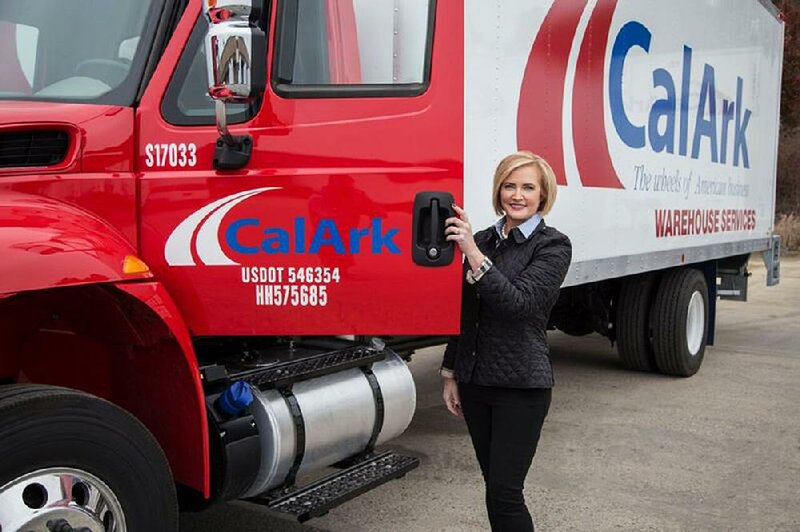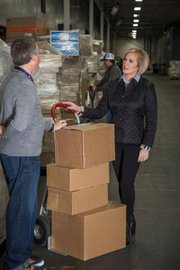In a state filled with heavy-hitting trucking companies, CalArk International in Little Rock has been quietly building a name for itself beyond its truckload heritage.
Almost three years ago it started a warehouse distribution services division, which has now reached a 100 percent growth rate.
In 1975, Tom Bartholomew started CalArk with three trucks in Malvern. His daughter, Rochelle Bartholomew, has led the company's growth into a midsize international truckload carrier with $130 million in annual revenue and 650 trucks with a strong presence in cross-border transportation. Most recently, the company has diversified its offerings into warehouse services and final-mile delivery.
"I've thought for a long time about the driver shortage and how we can grow different parts of our business that are more driver-friendly," explained Rochelle Bartholomew, the company's president and chief executive officer.
The new warehouse distribution services division's routes focus on the "final mile" of a delivery, which get drivers home every day, as opposed to traditional over-the-road trucking routes.
When CalArk saw an opportunity to buy a large warehouse adjacent to its corporate headquarters, Bartholomew said, "We thought the price was right, and we thought it was a good investment to try to get into warehousing. And then with the growth of e-commerce, it just seemed to me to make sense to try to get into that market."
John Kent, director of the supply chain management research center at the Sam M. Walton College of Business at the University of Arkansas at Fayetteville, also tied the increase in "final-mile" delivery to the growth of e-commerce.
"UPS, FedEx and the post office have been doing that for decades. Traditional trucking companies have not. They've only been doing it for a few years," Kent said. "As long as people order things that don't fit in small boxes, there's going to be a need for transportation to the home for all sorts of items."
Given the steady increase in online sales, consumers can now order almost everything online, up to refrigerators and sofas, which need specialized home delivery support. The National Retail Federation reported that 5 million more people did their Black Friday shopping online this year compared with 2015, while 3 million fewer shopped in stores.
"I have a lot of respect for Rochelle. Most larger companies will purchase other companies if they want that new service," said Malea McElyea, vice president of sustainability and business development at CalArk. "We literally started this service from zero and built it fast. It's really exciting to see that."
The segment now has 10 facilities in the Southeast and makes about $20 million in revenue.
That internal growth has not been without obstacles though, as Bartholomew explained. "There are great software and systems for truckload, and then there are some for warehousing, but getting good systems that really play well together has been a challenge."
"There have been so many cases in the past years where we're trying to do things that nobody has done before, so our suppliers are working with us to write things for the first time. With that comes a challenge, but we're improving every day," Bartholomew said. "Things are still out there that are pending and need improvement, so there's a challenge there, but I think it is going to pay off."
The company's smaller size serves as a "business advantage" when approaching these challenges, said Curt Vernon, vice president of warehouse services.
"With CalArk's size, we are able to move faster. If our customers say they have a certain requirement, we can make decisions and move faster," he said. "Bigger companies typically take longer, especially when it comes to adding services. It takes them longer to bring that to market. Over about a 90-day period we were able to make a decision and start up the final-mile division."
Another advantage for warehousing, according to Jason Martin, the segment's director of sales, is that the company is asset-based.
"A lot of companies doing things like this don't own their equipment," Martin said. "All of our drivers are employee drivers, too, so that model allows a much higher level of service to the customer."
Martin explained that many final-mile companies opt to use owner-operators to limit their liability, while CalArk has invested in safety technology to limit that liability and retained more quality control over the entire operation. "It costs a bit more from our standpoint, but the benefits far outweigh that."
Additionally, because CalArk has chosen to expand this division in smaller markets, "we don't have the ability to make a lot of mistakes and recover from those mistakes like you do in a major metro area," Martin said.
Most larger companies have rolled out these services in denser markets to ensure profitability, he said, while the smaller markets present less competition. "The revenues that you can make in a Houston compared to the revenues you can make in an Arkansas are night and day. And so we've had to be more efficient."
With the new division and the changes in the trucking industry, Bartholomew said she feels that she runs a different company than the one her father started.
"Our industry has changed so much, and it's still changing so fast. It's a different world than what we had years ago," she said. "Our industry is so much about technology now."
"I remember when I was coming into the business, a lot of our decision-making was based on assumptions and what we thought made sense," she said. "I don't know if we had a great understanding about which routes were making money for us."
Today, CalArk has invested heavily in internal data analytics and route optimization to develop that understanding.
She also cited a difference in customer relationships, as corporate decision-making has centralized.
"There was more of a relationship and just more loyalty back then. Now, with all the ways that corporations are doing business, it tends to be more centralized and less personal," she said.
Another change at CalArk has happened more gradually -- nearly 50 percent of the management are women -- a practically unheard-of statistic in a traditionally male industry.
"It's not that we set out intentionally to have X number of female management; it's just evolved."
"I wonder if it's because I'm here and maybe women are drawn to our business because of that," she said. "Whatever the reason is, it works really well for us. We're very happy with the team we have here."
McElyea agreed it might have to do with Bartholomew's example.
"When you say 'trucking industry,' people are usually going to think male-dominant and not see all the opportunities out there for everyone." Having a female CEO changes that perspective, she said.
As to whether her own two teenage daughters will get involved at the company too, Bartholomew is sitting back and letting them decide. "I encourage them to really open their minds to other kinds of business and other kinds of careers."
"Really, the truth is, you need to live your own dreams and you need to pursue your own interests," she said. "Sometimes I think in family business people just come into it because it's there or it's expected. If [my daughters] do become involved, I want it to be for the right reasons."
If they do choose trucking though, Bartholomew knows how to handle family business.
"As long as family members have a chance to have a vision of their own, have some opportunity to take things in a direction or at least a portion of the business and do with it what you want, I think it can be great."
SundayMonday Business on 12/11/2016


